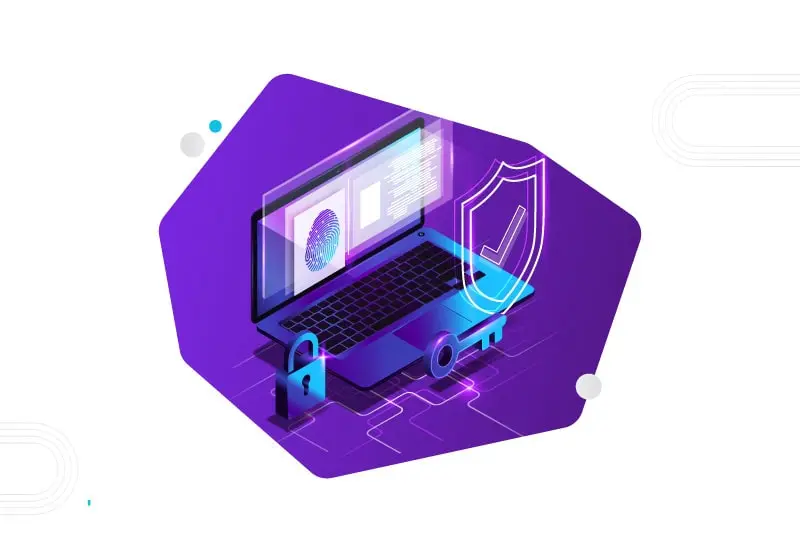In the vast realm of the internet, where privacy and security are paramount, proxy servers have become indispensable shields for individuals and businesses. However, not all proxy servers are the same. Understanding the various proxy server types is crucial in mastering the virtual landscape.
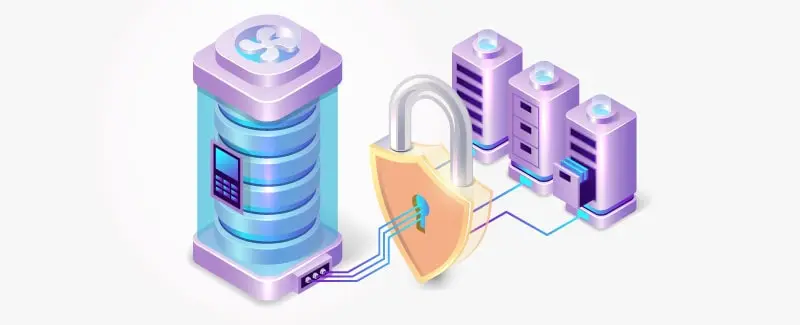
Welcome to our comprehensive guide, where we explore the intricacies of proxy server types. By delving into the realms of public and private proxies, we uncover their functionalities, advantages, and limitations. Armed with this knowledge, you’ll make informed decisions to safeguard your online activities and embrace new possibilities.
Public Proxy Server Types
In our interconnected digital landscape, where access to information is a necessity, proxy servers emerge as key players in granting us the freedom to explore the vast realm of the internet. But what is a proxy? In simple terms, a proxy acts as a middleman between your device and the websites you visit, intercepting your requests and forwarding them on your behalf.
Public proxy servers, the focus of this section, play a crucial role in this dynamic process. These proxies, readily available to the public, offer a gateway to the internet, allowing users to mask their identities and access restricted content. Let’s delve deeper into the world of public proxy server types to understand their features, benefits, and considerations.
One of the primary advantages of public proxy servers is their accessibility. With a multitude of options available, users can easily find free or low-cost public proxy servers to suit their needs. Whether you’re looking to bypass geographical restrictions, access region-locked content, or enhance your online privacy, public proxy servers can be invaluable tools.
However, like any technology, public proxy servers have their pros and cons. On the positive side, they provide a level of anonymity by masking your IP address, making it difficult for websites to track your online activities. This can be especially useful when browsing the web from locations where certain websites are blocked or censored.
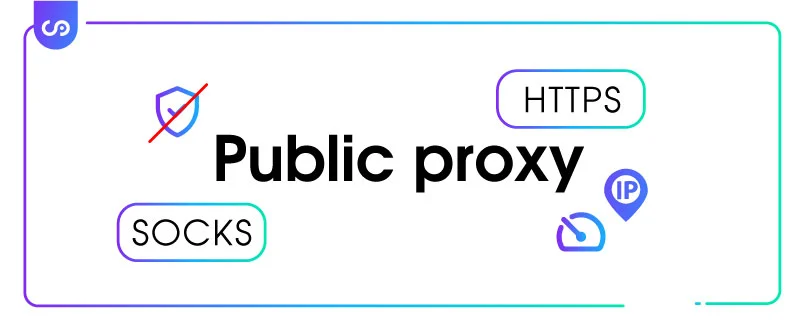
Nevertheless, it’s important to consider the potential downsides of using public proxy servers. Since they are freely accessible, they can attract a large number of users, leading to slower connection speeds and reduced browsing performance. Moreover, the security of public proxies can vary significantly, as some may be operated by unknown entities, potentially putting your sensitive information at risk.
Public proxy servers come in various types, each catering to different needs. The most common types include HTTP proxies, which handle regular web traffic, and HTTPS proxies, which provide secure communication between your device and the website. Another popular type is SOCKS proxies, known for their ability to handle a wide range of internet protocols.
As you venture into the realm of public proxy servers, it’s essential to weigh the advantages and disadvantages they offer. Consider factors such as connection speed, security, and the reputation of the proxy provider. By making informed choices, you can harness the power of public proxy servers to expand your online horizons while safeguarding your privacy.
In the next section, we will explore a different facet of proxy servers: private proxy server types. These dedicated gateways offer enhanced control, security, and performance. So, let’s continue our journey and unlock the secrets of private proxies.
Private Proxy Server Types
While public proxy servers provide a gateway to the online world, they often come with limitations that can hinder performance and compromise security. This is where private proxy servers step in, offering a whole new level of control, reliability, and exclusivity. In this section, we will explore the world of private proxy server types and uncover the advantages they bring to the table.
Private proxy servers, as the name suggests, are reserved for a select few, providing a dedicated and personalized browsing experience. Unlike their public counterparts, private proxies offer enhanced performance, robust security, and a host of advanced features tailored to meet specific requirements. Let’s dive deeper into the intricacies of private proxy server types and discover their unique benefits.
One of the primary advantages of private proxy servers is the exclusivity they provide. With private proxies, you have sole access to the server, eliminating the performance issues caused by sharing resources with a large number of users. This exclusivity translates into faster connection speeds, smoother browsing experiences, and improved overall performance.
Private proxy servers also offer enhanced security, making them an ideal choice for individuals and businesses looking to protect sensitive data and ensure online privacy. By using a private proxy, you can encrypt your internet traffic, safeguarding it from prying eyes and potential threats. This added layer of security is especially valuable when accessing confidential information or conducting critical online transactions.
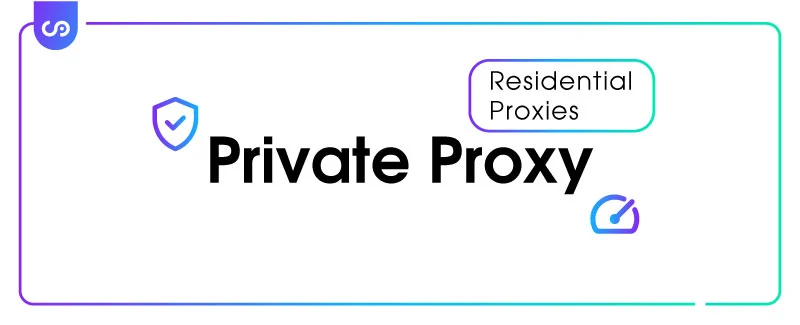
When it comes to private proxy server types, there are several options to choose from based on your specific needs. Dedicated private proxies provide exclusive access to a single user, ensuring maximum control over server resources and a higher level of security. Shared private proxies, on the other hand, allow multiple users to share the same proxy server while still maintaining a level of privacy and performance.
Another type of private proxy server gaining popularity is residential proxies. These proxies utilize IP addresses provided by internet service providers (ISPs), making them appear as regular residential users. Residential proxies are highly sought after for their ability to bypass restrictions imposed by websites and access geographically restricted content with ease.
As you venture into the world of private proxy servers, it’s crucial to assess your needs carefully. Consider factors such as speed, security, scalability, and customer support when selecting a private proxy server provider. With the right private proxy at your disposal, you can enjoy unparalleled control, reliability, and performance, unlocking new possibilities in your online endeavors.
In the next section, we will delve into the process of selecting the right proxy server type for your unique needs. We will explore key factors to consider and practical tips to help you make an informed decision. So, let’s continue our journey and discover how to choose the perfect proxy server type.
Choosing the Right Proxy Server Type
With a myriad of proxy server types available, selecting the perfect one can feel like navigating a vast sea of possibilities. In this section, we will embark on a quest to uncover the key factors that will guide you in choosing the ideal proxy server type for your specific needs. From speed and security to location and use cases, let’s explore the realm of proxy servers and empower your online journey.
- Speed: In the fast-paced digital landscape, speed is paramount. Consider your requirements for quick and responsive browsing. Private proxy servers often offer faster connection speeds due to their exclusivity, while public proxies might be more suitable for casual browsing or non-resource-intensive activities.
- Security: Protecting your online activities and sensitive information is vital. Evaluate the security features offered by different proxy server types. Private proxies, with their dedicated resources and encryption capabilities, provide a higher level of security compared to public proxies. Look for protocols like HTTPS and SOCKS5 that ensure secure and encrypted communication.
- Location: Depending on your specific needs, the geographical location of the proxy server can play a crucial role. For bypassing region-based restrictions or accessing localized content, opt for proxy servers located in the desired regions. Consider the global presence of proxy server providers and choose ones that offer a wide range of locations to cater to your diverse requirements.
- Reliability: Reliability is the foundation of a seamless online experience. Look for proxy server providers with high uptime guarantees and reliable infrastructure. Private proxies, with their dedicated resources, often offer better reliability compared to free or shared public proxies.
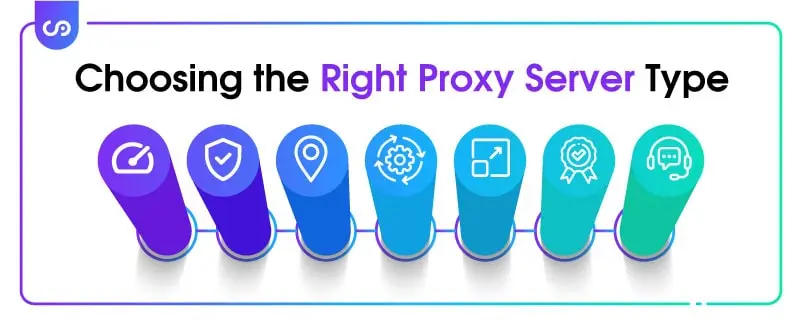
- Use Cases: Different proxy server types excel in specific use cases. Identify your primary purpose for using a proxy server. Are you engaging in web scraping, optimizing SEO, or seeking online privacy? Each use case may require a different proxy server type, such as dedicated private proxies for intensive scraping or residential proxies for bypassing website restrictions.
- Scalability: Consider your future needs and scalability requirements. If you anticipate an increase in web traffic or the expansion of your online activities, ensure that the chosen proxy server type can accommodate your growth. Private proxy servers often provide scalability options to meet changing demands.
- Customer Support: Having reliable and responsive customer support can make a significant difference in your proxy server experience. Look for proxy server providers that offer prompt assistance and technical support to address any concerns or issues that may arise.
By carefully weighing these factors, you will be equipped to make an informed decision when choosing the right proxy server type. Remember, there is no one-size-fits-all solution, and what works for one person or business may not work for another. Take the time to evaluate your unique requirements, prioritize your needs, and select a proxy server type that aligns with your goals and aspirations.
In conclusion, by understanding the importance of speed, security, location, reliability, use cases, scalability, and customer support, you can unlock the true potential of proxy servers. These gateways to the web will empower your online journey, providing you with enhanced privacy, expanded access, and the ability to navigate the digital landscape with confidence.
Conclusion
Proxy server types serve as the key to unlocking a world of possibilities in the digital realm. Whether you opt for public proxies, providing accessibility and convenience, or private proxies, offering exclusivity and enhanced security, understanding the nuances of these server types is essential. By considering factors such as speed, security, location, and scalability, you can make informed choices that align with your specific needs and goals. Embrace the power of proxy servers to enhance your online experience, protect your privacy, and navigate the internet with confidence and control. With the right proxy server type by your side, you hold the key to a seamless and empowered online journey.
FAQs
What is the difference between public and private proxy servers?
The main difference between public and private proxy servers lies in their accessibility and exclusivity. Public proxy servers are available to the general public, while private proxy servers offer dedicated access to a select few or a single user, providing enhanced control and performance.
How do public proxy servers differ from private ones in terms of security and anonymity?
In terms of security and anonymity, private proxy servers generally offer higher levels of both. Private proxies provide dedicated resources and encryption capabilities, ensuring better protection of sensitive information and stronger anonymity compared to public proxies, which are more susceptible to potential security risks.
What are the most common types of proxy servers?
The most common types of proxy servers include HTTP proxies, HTTPS proxies, and SOCKS proxies. HTTP proxies handle regular web traffic, HTTPS proxies offer secure communication, and SOCKS proxies are known for their versatility in handling various internet protocols.
Can I switch between different types of proxy servers easily?
Yes, it is possible to switch between different types of proxy servers relatively easily. However, the process may vary depending on the proxy server provider and the specific configurations required. It often involves updating the proxy settings in your device or application to connect to the desired proxy server type.

